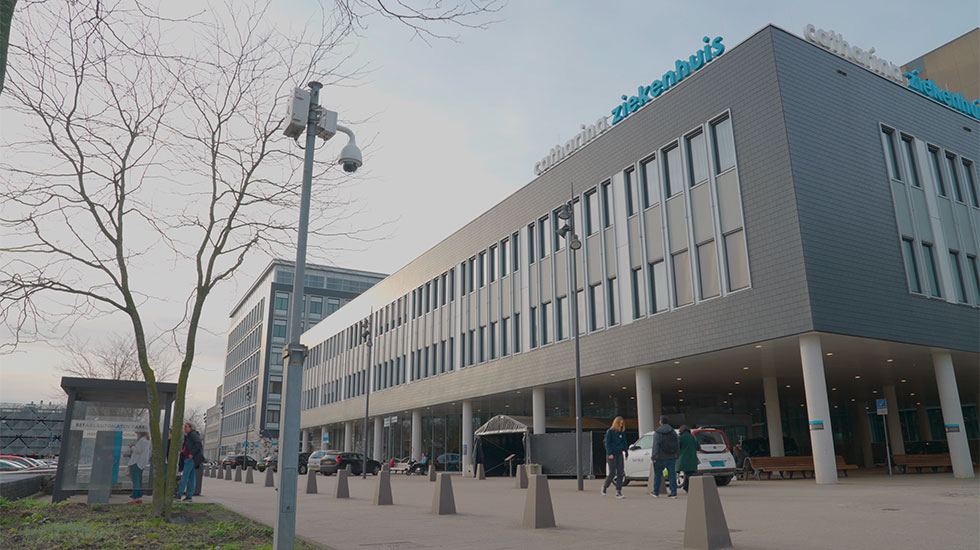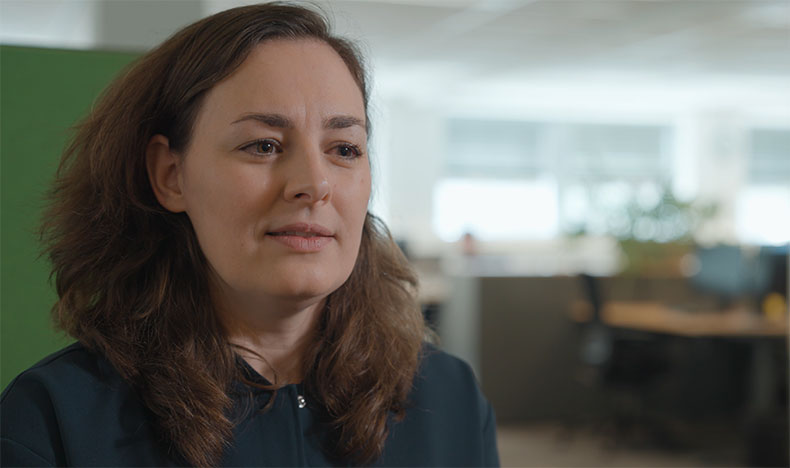Catharina Ziekenhuis: Zorgverlener en AI moeten team vormen
jul 11, 2022 | 3 minuten leestijd
Continue verbetering, innovatie en wetenschap zijn verankerd in de cultuur van het Catharina Ziekenhuis Eindhoven. Het topklinische ziekenhuis zet dan ook in op de toepassing van Artificial Intelligence (AI). Maar, net als in de gehele gezondheidssector, is er nog geen sprake van brede toepassing van AI in het ziekenhuis.

“Veiligheid en kwaliteit staan voorop in de zorgsector en daardoor kost de ontwikkeling van AI tijd”, geeft Eva Deckers, Head of AI Center of Excellence in het ziekenhuis, aan. “Daarnaast berust de ontwikkeling van AI op data. Om de juiste data op de goede manier bij elkaar te brengen en in te zetten, heb je een goede technische basis nodig. Daar zetten we vol op in, het duurt even voordat je daar de vruchten van plukt.”
Hoewel er nog veel werk te verzetten is, loopt het ziekenhuis toch voorop in de AI-ontwikkeling. Het is daarom onderdeel van de brAInpower-expositie in het Philips Museum over de geschiedenis en toepassing van AI. Deel van de tentoonstelling is een video met Eva Deckers en haar collega’s Coen Hurkmans (klinisch fysicus) en Nienke Bakx (Qualified Medical Engineer). In deze video wordt duidelijk in welke mate het ziekenhuis nu al gebruik maakt van AI, bijvoorbeeld bij de behandeling van kanker, en wat de mogelijke toekomstige ontwikkelingen zijn.

Toegevoegde waarde
Het ziekenhuis zette in 2022 de stap om te investeren in een AI Expertisecentrum. Dit centrum stelt zich als doel AI in de handen van zorgverleners te brengen. Om dit voor elkaar te krijgen, bouwt het team aan een AI-platform waarop data vanuit verschillende systemen beschikbaar zijn voor het ontwikkelen, trainen en exploiteren van AI-modellen. Dit binnen gestelde juridische, privacy- en ethische kaders. Ook werkt het team met zorgprofessionals en andere disciplines samen om modellen uit de markt toepasbaar te maken in de context van het ziekenhuis. “Het is een taak van het expertisecentrum om samen met gebruikers te bepalen voor wie en op welke manier AI echt toegevoegde waarde heeft”, aldus Deckers.

Duidelijke kaders
Deckers ziet de potentie van AI in de gezondheidszorg, maar stelt wel duidelijke kaders binnen haar ziekenhuis. “AI op zichzelf is geen oplossing, een nieuw verbeterd werkproces of patiëntervaring ondersteund door AI is dat wel.” Te vaak ziet ze dat AI wordt ingezet om dingen te doen waarvan je je kan afvragen of we ze überhaupt moeten doen of dat we ze op deze manier moeten doen. “Iedereen moet zich realiseren dat de inzet van AI verre van gratis is, voor de portemonnee zowel als voor onze wereld niet.”
Versnellen
De eerste toepassingen in het ziekenhuis laten volgens Deckers zien dat je mooie dingen voor elkaar krijgt binnen deze kaders. “Zo werkten Coen Hurkmans en Nienke Bakx aan de toepassing voor het voorbereiden van bestralingstherapie voor mensen met borstkanker. Je moet voor deze behandeling nauwkeurig de borst en het te bestralen gebied in kaart brengen. Doordat AI dit proces ondersteunt, kost het nog maar de helft van de tijd.”
Impact
De echte impact van AI in gezondheidzorg ligt nog voor ons, zo is Deckers overtuiging. “De komende tijd zullen we vooral zorgprocessen stroomlijnen met de inzet van AI. Met de verbeteringen in de beschikbaarheid van data over zorginstellingen heen zullen we grotere stappen zetten, dan zal AI ons helpen om de zorg efficiënter te coördineren en de schaarse capaciteit die we hebben nog effectiever in te zetten. We werken toe in ons ziekenhuis naar zorg die gepersonaliseerd is op de individuele patiënt. De zorgverlener en AI zullen samen een team vormen dat heel precies bepaalt hoe behandeling er uit ziet. Dat vraagt van ons om echt anders te denken over hoe we zorg verlenen, en om vervolgens AI in te zetten om daar te komen.”
Bezoek de brAinpower-expositie in het Philips Museum voor meer informatie over Artificial Intelligence.
Catharina Hospital: Care Provider and AI Must Form a Team
Continuous improvement, innovation, and science are ingrained in the culture of Catharina Hospital Eindhoven. As a top clinical hospital, it focuses on the application of Artificial Intelligence (AI). However, similar to the broader healthcare sector, AI is not yet widely applied in the hospital.

"Safety and quality are paramount in healthcare, and that means the development of AI takes time," says Eva Deckers, Head of the AI Center of Excellence at the hospital. "Moreover, AI development relies on data. To bring the right data together in the right way and use it effectively, a solid technical foundation is essential. We are fully committed to this, but it takes time before we can reap the benefits."
Despite the challenges ahead, the hospital is at the forefront of AI development. This is why it is part of the brAInpower exhibition at the Philips Museum, which showcases the history and application of AI. The exhibition features a video with Eva Deckers and her colleagues Coen Hurkmans (clinical physicist) and Nienke Bakx (Qualified Medical Engineer). In this video, they explain the extent to which the hospital is already using AI, for instance in cancer treatment, and what future developments might look like.

Added Value
In 2022, the hospital took a significant step by investing in an AI Expertise Center. This center aims to bring AI into the hands of healthcare providers. To achieve this, the team is building an AI platform where data from various systems are available for developing, training, and deploying AI models. This is done within established legal, privacy, and ethical frameworks. The team also collaborates with healthcare professionals and other disciplines to make market models applicable in the hospital's context. "It is the expertise center's task to determine, together with users, for whom and in what way AI truly adds value," Deckers explains.

Clear Guidelines
Deckers sees the potential of AI in healthcare but sets clear guidelines within her hospital. "AI itself is not a solution; a new, improved workflow or patient experience supported by AI is," she notes. Too often, she observes AI being used for tasks that raise questions about their necessity or the methods employed. "Everyone must realize that deploying AI is far from free, both financially and environmentally."
Accelerating
The first applications in the hospital show that significant achievements are possible within these guidelines. "For instance, Coen Hurkmans and Nienke Bakx worked on an application for preparing radiation therapy for breast cancer patients. For this treatment, it is crucial to accurately map the breast and the area to be irradiated. With AI supporting this process, it now takes only half the time."
Impact
Deckers is convinced that the real impact of AI in healthcare lies ahead. "In the coming period, we will primarily streamline care processes using AI. With improvements in data availability across healthcare institutions, we will take bigger steps. AI will then help us coordinate care more efficiently and use our scarce capacity more effectively. In our hospital, we are working towards care that is personalized for the individual patient. Care providers and AI will form a team that precisely determines the course of treatment. This requires us to rethink how we deliver care and to use AI to achieve that."
